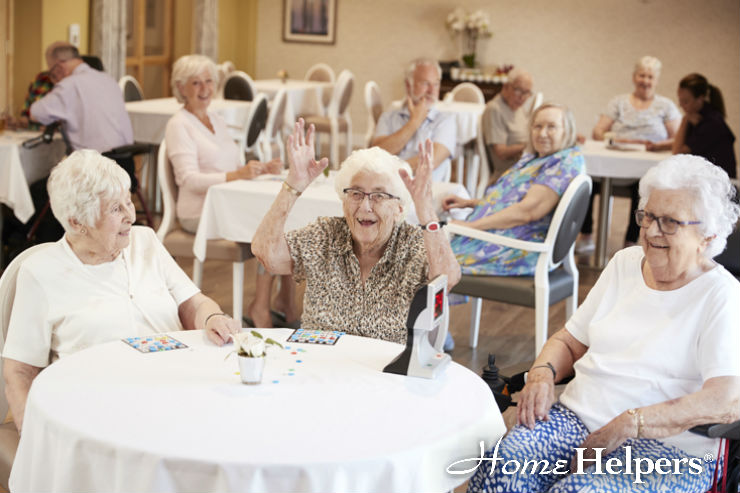Did you know that Bingo has been recognized not only as a great pastime for the elderly, but also a great way to sharpen memory and thinking skills? It’s true! There are lots of positive benefits to playing Bingo on a regular basis—let’s look at a few!
Inclusivity
It makes no difference whether you are physically challenged, sitting in a wheelchair, or struggling with dementia. Bingo has a fun way of bringing together family and friends to create the perfect environment of fun where everyone feels welcome! No matter your skill level, you can play and have a lot of fun, even if you’re just beginning.
Improves Physical Health
Bingo is not exactly a game that gives you a cardio workout, but it does bring its own benefits! Research has shown that elderly clients heading into their 80s do much better overall and need far less assistance with everyday tasks such as getting dressed if they had an active social life. Bingo is just one way elderly friends can get together and have some fun, making this research more valid than ever! The study concluded that people with active social interaction with friends remained free of disabilities and challenges about twice as long as those who do not interact with friends.
Provides an Outlet for Social Interaction
Seniors are often susceptible to depression or anxiety. Having a social life that is active is one of the best ways to combat these problems! What better way than Bingo for seniors to hang out with friends, and even make new friends who can continue the friendship outside the Bingo Hall!
Improves Mood
We all need laughter in our lives and seniors are no different! Laughter releases our “feel good” hormones called endorphins, and that is what gives us relief from stress and elevates our mood. Laughing together with friends and family creates an overall feeling of calm and wellbeing, and even can relieve chronic pain! Having a good time is good for what ails you, whether it’s emotional or physical, and seniors are no different!
Promotes Healing
Other studies have shown that seniors who undergo surgical procedures or have been in the hospital will recover faster with shorter hospital stays when they have an active social life playing games like Bingo. This is partly due to the positive power of endorphins as they recover.
Helps Sharpen Cognitive Functions
Playing Bingo makes us think a little bit about the information in front of us. As we try to retain that info, the game of Bingo has done a very important job in helping seniors with cognitive challenges to stay engaged in the game and thinking through their options. It’s a good exercise for the brain to listen for the numbers called out and to try to quickly locate them on the board. Just this simple game can sharpen memory and help seniors think more quickly!
Improves Hand-Eye Coordination
As seniors continue to age, they may notice that reflexes and hand-eye coordination can be decreased. Bingo has a pretty fast pace and keeps the players engaged and focused, looking for the numbers that have been called out. While this is engaging the hand, brain, and eyes, it is also delaying the onset of issues such as dementia or Alzheimer’s Disease.
Who knew Bingo could have so many positive effects on our elderly loved ones? If you want to know more information or are just curious about how Bingo can help the seniors in your life, please contact us today!
Home Helpers of Pittsburgh is a locally-owned, trusted home health care agency and offers quality, compassionate senior in-home care services including home care assistance, personal care, companion care, respite care, 24-hour care and live-in care, Alzheimer's & dementia care, Parkinson's care, stroke recovery care, as well as homemaker services in Allison Park, Bellevue, Bradford Woods, Cheswick, Cranberry Township, Etna, Fox Chapel, Franklin Park, Gibsonia, Glenshaw, Hampton, Indiana Township, Mars, McCandless, North Hills, Oakmont, O’Hara Township, Pittsburgh, Ross Township, Seven Fields, Sewickley, Shaler, Treesdale, Warrendale, West Deer, Wexford, and Zelienople, Pennsylvania.
Legal Disclaimer
This blog provides general information and discussions about medicine, health, and related subjects. The words and other content provided in this blog, and in any linked materials, are not intended and should not be construed as medical advice. If the reader or any other person has a medical concern, he or she should consult with an appropriately-licensed physician or other healthcare workers.
Never disregard professional medical advice or delay in seeking it because of something you have read on this blog or in any linked materials. If you think you may have a medical emergency, call your doctor or 911 immediately.
The views expressed on this blog and website have no relation to those of any academic, hospital, practice or other institution with which may have been mentioned or linked to in the article.

